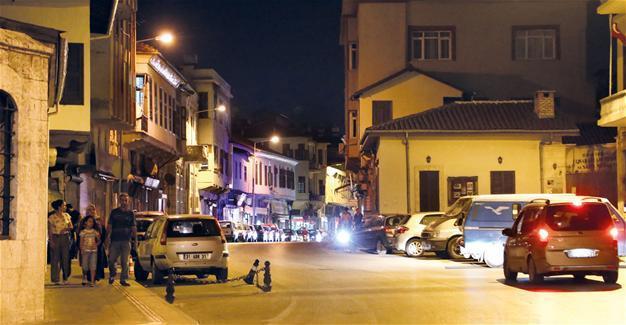Ancient illuminated street to be unearthed
HATAY – Anadolu Agency

Kurtuluş Street (Herod Caddesi) in Antakya in the southern Turkish province of Hatay, a kind of shopping center for the rich in the ancient era known as the “world’s first illuminated” street, is set to come back to life nine-meters underground. The first traces of human settlement in Antakya date back to the Paleolithic Age.
The Habib-i Neccar mosque is believed to be the first mosque in Anatolia, while the St. Peter’s Church, built into a 13-meter deep cave, is among the oldest churches in Christianity. The historic area, today known as “Nişantaşı,” is at the forefront of one of the modern-day city’s busiest places, which is today surrounded by many old stone buildings and shops. The Roman road with ancient columns, which is currently under the ground, will be brought back to life by the works to be conducted by the Hatay Metropolitan Municipality.
Work is due start on the project in the middle of next year following consultations between the Monuments Board, museum and university authorities. The street, around seven to nine meters below the ground, will be reached via tunnels and re-illuminated with LEDs to make it a new center of attraction for the city.
Hatay Mayor Lütfü Savaş said works were still continuing in Kurtuluş Street, where some of the oldest streets in Antakya are located, and in sections around the long bazaar. Savaş stated that the most important part of these works is the uncovering of the remaining part of the historical Kurtuluş Street. “In the past, people from today’s Jordan and Latakia came to Kurtuluş Street to shop. People from across the Middle East chose the former place called Herod Street for shopping. The city had its heyday during the era of King Herod, and back then the days were not enough to satisfy shoppers.
Shopping at night It was then that Kurtuluş Street became the first street to be illuminated in the world, so people could shop at night. This is where the innovation of street lighting started,” he added. Savaş said they aimed to return the street to its ancient glory, so the municipality had taken an X-ray of the ground from the Habib-i Neccar mosque to the northeast. Georadars were also used to get a clear picture of the area.
“We found old cobbles about seven to nine meters below the ground. We will work to open a tunnel to the old ground, which we will illuminate with led lights. We will make a 100-meter walking park on the floor below. This will bring the ancient street back to life, while the upper street will continue to function normally,” he added. Savaş said the project will make a great contribution to the city’s economy and local tradespeople upon completion.
 Kurtuluş Street (Herod Caddesi) in Antakya in the southern Turkish province of Hatay, a kind of shopping center for the rich in the ancient era known as the “world’s first illuminated” street, is set to come back to life nine-meters underground. The first traces of human settlement in Antakya date back to the Paleolithic Age.
Kurtuluş Street (Herod Caddesi) in Antakya in the southern Turkish province of Hatay, a kind of shopping center for the rich in the ancient era known as the “world’s first illuminated” street, is set to come back to life nine-meters underground. The first traces of human settlement in Antakya date back to the Paleolithic Age.